- Camphene
- Camphor
- Cannabinoid Hyperemesis Syndrome
- Cannabinoids
- Cannabis
- Cannon
- Capsule
- Carb
- Carb cap
- Carding
- Carene
- Carpet weed
- Cartridge
- Caryophyllene
- Cashed
- CB1 receptor
- CB2 receptor
- CBC
- CBD
- CBD oil
- CBDA (cannabidiolic acid)
- CBDV (cannabidivarin)
- CBGA (cannabigerolic acid)
- CBL (cannabicyclol)
- CBLA (cannabicyclolic acid)
- CBN (cannabinol)
- Cedrene
- Certificate of analysis
- Cheeba
- Cherried
- Chronic
- Circ perc
- Citronellol
- Clone
- Closed-loop system
- Co-op
- CO2
- CO2 extraction
- CO2 oil
- Cola
- Combustion
- Concentrate slurry
- Concentrates
- Cone
- Convection
- Cottonmouth
- Cotyledon leaves
- Creeper
- Cross
- Crumble
- Crystalline
- Cultivar
- Cultivation
- Cure
- Cymene
Camphene is a terpene found in cannabis, as well as other plants. It is common to conifers, such as Douglas fir and camphor tree. It is also found in nutmeg, cypress oil, bergamot oil, and valerian, and is the distinguishing terpene found in camphor oil and mothballs.
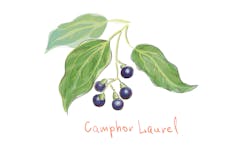
A transparent, waxy, flammable terpene. Camphor produces an intense aroma responsible for the minty flavor in cannabis. It’s also naturally found in certain trees in the laurel family, the kapur tree in South East Asia, rosemary leaves, camphorweed, and camphor basil.

Cannabinoid Hyperemesis Syndrome (CHS) is a medical condition believed to be connected to heavy, chronic cannabis use. It is characterized by episodes of nausea and vomiting, which may be relieved by hot baths and showers or by discontinuing cannabis use.
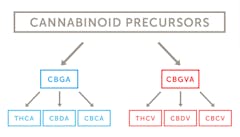
Compounds in the cannabis plant, such as THC and CBD, which have the ability to interact with cannabinoids receptors in the body’s endocannabinoid system. These interactions may result in a variety of subjective and therapeutic effects including euphoria, appetite stimulation, and relief of symptoms like pain.

Cannabis is a genus of the flowering plant family Cannabaceae, including Cannabis sativa, Cannabis indica, and Cannabis ruderalis. Cannabis has been cultivated all over the world for centuries for its medicinal properties. There are thousands of varieties of cannabis made unique by natural compounds called cannabinoids.
A cannon is a product name for a type of cannabis cigarette aka joint. Specifically, a cannon is a joint that is bigger and more cylindrical; like the wide, long shape of a cannon.
An ingestible form of cannabis, usually an oil, that has been enclosed in a tablet to be taken orally.
A small hole in a pipe or bubbler, usually next to the bowl, that allows the consumer to control airflow when smoking. A carb also helps regulate temperature and the rate of burning in the bowl. Bongs can have carbs as well, though they often have a removable bowl that acts like a carb.

A device that helps regulate the amount and direction of air going to the nail on a dab rig, helping you take a better hit. Like the carb hole on the side of a hand pipe, a carb cap gives a dabber more control over their dab.
Showing ID as proof of age at a cannabis dispensary or with a delivery service so you can purchase cannabis products. Carding ensures dispensaries aren’t selling to minors. “I always get carded twice when I go to the dispensary—when I first walk in and at the cash register.” “Carding customers helps dispensaries remain compliant.
Delta-3 carene is a terpene found in cannabis and other plants, including rosemary, lemons, and trees such as pines and cedars. Its citrusy and cypress aroma is used in food flavorings and cosmetics products. Medicinally, carene may improve bone health and be used as an anti-inflammatory.
Pieces of weed found on the floor, usually bits that have fallen off a table when rolling a joint or packing a bowl. People smoke carpet weed as a last resort, when their stash is out. “I’m hard up on weed so I’ve been on my hands and knees looking for some carpet weed.
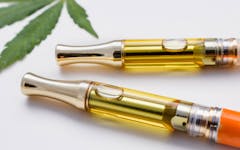
A pre-filled tank of cannabis concentrate designed to work in a vape system. Cartridges, or “carts,” also incorporate a heating element, which vaporizes the oil. Most cartridges screw onto a battery with 510 thread but some have unique fittings. Cartridges usually come in a half-gram or full gram of cannabis oil.
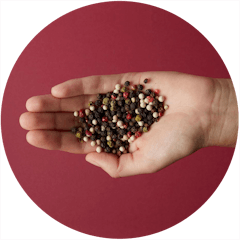
Caryophyllene is a terpene found in cannabis, as well as in many other plants such as cloves and black pepper. Sometimes referred to as beta-caryophyllene or BCP, this terpene is known for its pungent peppery and earthy aroma and flavor. Some studies suggest caryophyllene may help reduce pain, anxiety, depression, and substance addiction.
Slang for when a bowl of cannabis flower is done. A bowl is cashed when no smokable material remains, only ash and residue. “After three hits, my bowl is cashed.” “If you don’t clean your bowl after it’s cashed, the residue will build up and clog your pipe.
CB1 receptors are one type of cannabinoid receptor found in the body. Cannabinoids like THC interact with these receptors to induce some of the subjective and therapeutic effects associated with cannabis.
CB2 receptors, or cannabinoid receptor type 2, is an important part of the endocannabinoid system, a biological network of endocannabinoids, receptors, and enzymes with which cannabis interacts. This type of cannabinoid receptor is expressed primarily in cells of the body’s immune system, whereas CB1 receptors are heavily concentrated in the brain and nervous system.
CBC, or cannabichromene, is a cannabinoid found in the cannabis plant, alongside better known cannabinoids like CBD and THC. Like CBD and THC, it is considered one of the “big six” cannabinoids prominent in current medical research. Unlike THC, CBC is not intoxicating.

CBD, short for cannabidiol, is a non-intoxicating compound produced by the cannabis plant that is popularly used for a variety of medical applications including pain, anxiety, and seizures. Although most cannabis varieties contain high levels of the euphoric compound THC, the plant can be bred to produce increased amounts of other compounds like CBD.

CBD oil is the result of the cannabinoid CBD extracted from cannabis or hemp. This oil can then be vaped or used to make tinctures, edibles, topical, and more.
CBDA (cannabidiolic acid) is the raw form or precursor of the well-known cannabinoid CBD (cannabidiol), and is a compound widely found in CBD-rich cannabis cultivars. When CBDA is exposed to heat or UV light, decarboxylation takes place and the compound is converted into CBD.
Cannabidivarin is a minor phytocannabinoid found in cannabis. This lesser-known cannabinoid is non-intoxicating and does not induce a high when consumed. CBDV tends to be found in higher concentrations in cultivars that are high in CBD and low in THC.
Cannabigerolic acid, or CBGA, is the raw form of CBG (cannabigerol). CGBA is a unique compound that forms the building block for major cannabinoids THC, CBD, and CBC. Research indicates that CBGA also holds significant therapeutic potential, with studies thus far suggesting antioxidative and anticancer properties.
CBL (cannabicyclol) is a non-intoxicating minor cannabinoid found in cannabis. Similar to cannabinoids like CBN (cannabinol), CBL is a cannabinoid that forms when CBC (cannabichromene) degrades through exposure to UV light and oxidation. Research on this minor cannabinoid has been slow to progress, and little is known about the properties and therapeutic qualities of CBL.
CBLA (cannabicyclolic acid) is a rare non-intoxicating compound found in cannabis. CBLA is not an original cannabinoid present in living cannabis plants, but a photochemical product formed as a result of environmental changes that alter the chemical composition of CBCA (cannabichromenic acid).
Cannabinol, also known as CBN, is a non-intoxicating cannabinoid that is created when THC ages. It is usually present in older cannabis and known for its antibacterial, anti-inflammatory, and neuroprotectant effects. “I can’t tell if the CBN in this old joint gets me high or not.
Cedrene is a sesquiterpene found in cannabis and cedar wood. With a fresh, woody, and sweet scent, cedrene adds an appealing dimension to the scent profile of cannabis.
A document showing the potency and purity of a cannabis product. Provided by a licensed analytical testing lab, the certificate of analysis (COA) lists cannabinoid levels and the testing of pesticides, mold, microbials, and other contaminants, ensuring a product has been tested according to state law and is safe for consumption.
Cheeba is a slang term for cannabis of Mexican Spanish origin popularized in the 1960s. “Is this cheeba sativa?” “Roll me a joint of that cheeba.” History of cheeba Cheeba is a Mexican Spanish word for cannabis dating back to the mid-1900s that derives from the word “chiva,” a Spanish word for heroin.
When a bowl of flower stays lit without the use of a lighter. The continuous burning creates a glowing ember that resembles a red cherry, hence the name. “I don’t need a lighter to hit this; the bowl’s cherried.
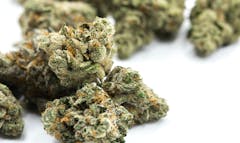
A slang term for high-quality, potent cannabis, popularized in the 1990s and 2000s with music producer Dr. Dre’s albums The Chronic and 2001. “My homie and I smoked some dank chronic last night and I’m still feeling it a little this morning.
A circular percolator, or “circ perc,” is made up of one ring with slits in the side or numerous rings with gaps in between. It is similar to a showerhead perc, which gets its name because it has holes or slits on the bottom. All percolators diffuse smoke, making hits cooler and less harsh.
Citronellol is a terpene found in some strains of cannabis, as well as in essential oils and other plants such as citronella, basil, eucalyptus, ginger, catnip, and Cymbopogon citratus (a plant with antihypertensive properties). It is commonly used as a fragrance in perfumes and as a flavoring agent in food and drinks.
A cutting taken off a marijuana plant, which will grow into another full plant. A clone is a genetic replica of the mother, the plant it was taken from. “I like starting from clone rather than seed because you skip the germination and sexing steps.
A cannabis extraction system that uses solvents such as butane or propane to remove oils from cannabis plant material inside a closed system, not open to the outside environment. A closed-loop system can collect solvent used and run it through cannabis material multiple times, allowing for the efficient extraction of specific cannabinoids and terpenes.
An organization of cannabis consumers or operators, including growers, extractors, or manufacturers, who share space to minimize costs. Cannabis co-ops and collectives were popular under the Compassionate Use Act in California in the days of medical marijuana, but were phased out there in 2019.
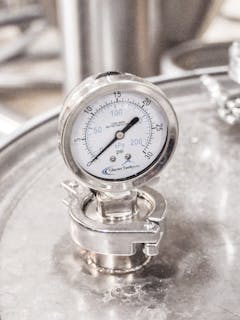
The chemical formula for carbon dioxide. CO2 can be used as a solvent to extract cannabinoids and terpenes from the cannabis plant into a concentrate, commonly known as CO2 oil. Also, in indoor cannabis growing, CO2 can be added to the environment in small amounts to aid photosynthesis, helping marijuana plants grow quicker and stronger.
An extraction method that uses CO2 as a solvent to strip the cannabis plant of cannabinoids and terpenes into a concentrate, commonly known as CO2 oil. CO2 extraction relies on a closed-loop system and the chemical is purged from the final product. “I like CO2 shatter more than crumble.
A cannabis concentrate made through CO2 extraction, which uses CO2 as a solvent to strip the cannabis plant of cannabinoids and terpenes into a concentrate.
A cola is a cluster of buds that grow together on female cannabis plants. During trimming, large colas are usually broken up into individual buds or nugs, so they can dry and cure more evenly to prevent mold. Buds contain cannabinoids and terpenes that get you high or offer medicinal benefits.
The process of burning something. When a flame is put to cannabis flower, it will combust, and cannabinoids and terpenes will enter the body when inhaled. Combustion differs from vaporization, which involves a phase shift of a substance. “You can’t smoke cannabis without combusting it.” “Vaporization offers more temperature control than combustion.
During extraction, a concentrate slurry is the mixture of cannabis plant matter and chemical solvent in a closed-loop system before purging. Depending on the solvent and cannabis material used, the slurry may be solid, liquid, runny, or airy.

Concentrates, also known as extracts, are produced from cannabis trichomes, which contain the cannabinoids, terpenes, and other compounds which give cannabis its recreational and medical effects. There are a variety of methods to create and process concentrates, and they can generally be lumped into two categories: full-spectrum concentrates and isolates.
A type of joint shaped like a cone, that is big on one end and tapers down to a small end with a crutch or filter. Their shape allows for a smoother burn so they don’t have to be relit.
Convection vaporization heats cannabis flower or extracts through indirect heat, as opposed to conduction, which heats through direct heat, and which most cannabis vaporizers use. These processes are analogous to a convection oven in your home, which heats air, which in turn cooks food (convection), and a pan on a stovetop (conduction).
Cottonmouth is the sensation of a dry or parched mouth and throat after smoking cannabis. It is likened to the feeling of having a mouth full of cotton balls. “This OG Kush gives me such bad cottonmouth, yet I keep smoking it.” “I always keep water with me after a sesh to prevent cottonmouth.
The first tiny leaves that appear when a cannabis seed sprouts, or germinates. Cotyledon leaves are round with smooth edges and usually grow in pairs. As the cannabis plant matures, the cotyledons will fall off and fan leaves will grow. “Seeing the cotyledons is a good sign—it means your seed has successfully germinated.
A strain that takes a while for the onset of effects, but when they do come on, they hit strong. The delay between consumption and feeling effects gives the sense that the strain creeps up on you.
A cross is a cannabis strain that combines the genetics of two other strains, or a hybrid. Cross can also be short for “crossbreeding,” or the act of crossing two strains to make a new one. “Super Lemon Haze is a cross of Super Silver Haze and Lemon Skunk.
A cannabis concentrate with a dry, powdery consistency—it crumbles easily, hence its name. Crumble, sometimes called “honeycomb” because of its appearance, is one of the driest forms of concentrate and is made through an extraction process similar to shatter, using a chemical solvent such as butane, propane, or CO2.
A cannabis isolate with over 99% cannabinoids. Also called “diamonds” or “isolates,” these have such a high degree of purity that they form a crystalline solid. This extract is usually made from concentrated THCA, CBDA, or CBD.
Short for “cultivated variety,” cultivars are groups of cannabis plants that differ in appearance, aroma, and effect. In cannabis, the term “strain” is commonly used, though it is not used in traditional horticulture. “I love growing this Maui Wowie cultivar because it’s so flavorful.” “Certain cultivars produce more THC than others.

The process of growing cannabis plants, including preparing soil, germinating seeds, cloning, planting, tending plants, harvesting, and more. “Large-scale cannabis cultivation is a sight to behold!” “Cannabis cultivation can get you in big trouble with the authorities if you’re not in a legal state.
The process of preserving cannabinoids and terpenes in cannabis buds by placing them in airtight containers after harvesting. Curing is distinct from, and done after, the drying phase of harvesting. How to cure marijuana Curing is often overlooked, yet it is an important part of the growing process.
A common terpene found in hundreds of different plants, including cannabis. It often shows up on the dinner table in cumin, oregano, thyme, anise, and coriander. Its aroma and flavor have hints of citrus, earth, and wood. It is not a primary compound in cannabis and only shows up in small amounts in some strains.